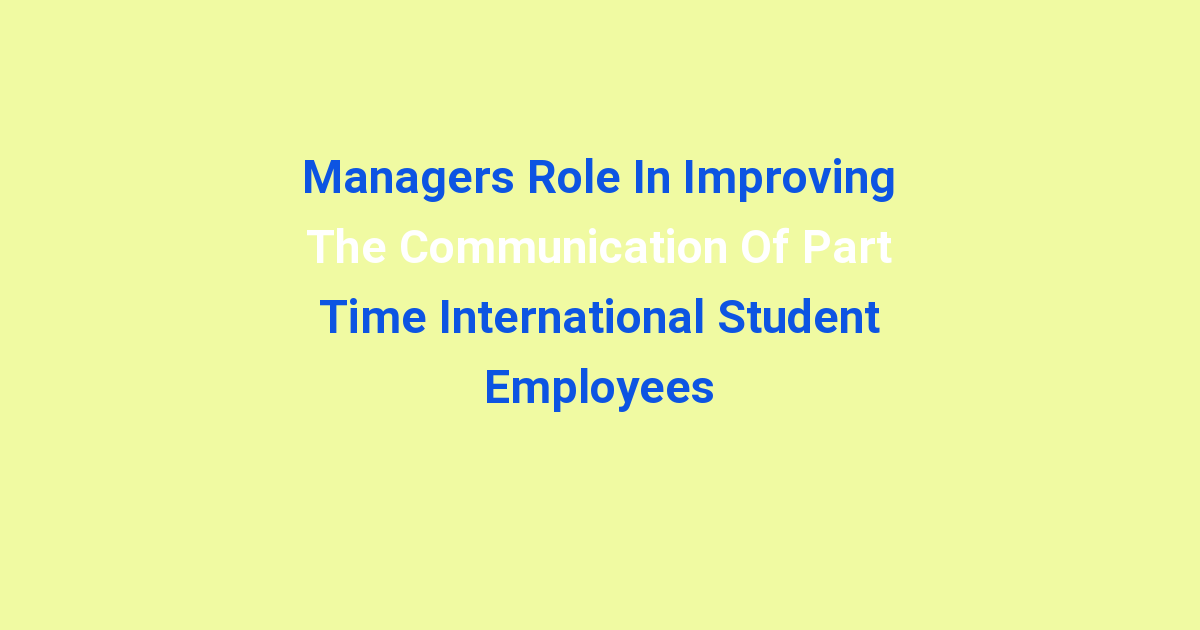Improving communication for part-time international student employees is an important responsibility for managers.
Manager’s Role in Improving Communication of Part-Time International Student Employees
Introduction
In today’s globalized world, businesses are increasingly hiring part-time international student employees to bring diversity and new perspectives to the workforce. However, one of the challenges faced by managers in multinational companies is the communication barrier that often exists between these employees and their colleagues. Effective communication is crucial for the success of any organization, and it is the responsibility of managers to bridge the communication gap between part-time international student employees and the rest of the team.
Problem Statement
Part-time international student employees may face challenges in effectively communicating with their colleagues due to language barriers, cultural differences, and lack of confidence in their communication skills. This can lead to misunderstandings, inefficiencies, and decreased productivity in the workplace. Managers need to identify these communication barriers and take proactive steps to address them in order to create a more inclusive and productive work environment.
Existing System
In many organizations, the communication between part-time international student employees and their colleagues is largely informal and ad-hoc. There may be a lack of structured communication channels or support systems in place to help these employees overcome language and cultural barriers. As a result, these employees may feel isolated, overlooked, or misunderstood in the workplace, leading to decreased job satisfaction and motivation.
Disadvantages of the Existing System
– Lack of effective communication can lead to misunderstandings and conflicts in the workplace.
– Part-time international student employees may struggle to express themselves or ask for help when needed.
– Miscommunication can result in errors, delays, and inefficiencies in work processes.
– Lack of inclusivity and support for diverse employees can lead to feelings of alienation and disengagement.
Proposed System
To improve the communication of part-time international student employees, managers can implement the following strategies:
– Provide language and cultural training: Managers can offer language classes, cultural orientation sessions, or communication workshops to help employees develop their communication skills and bridge cultural differences.
– Foster a supportive work environment: Managers can create a welcoming and inclusive work environment where all employees feel valued, respected, and supported. This can help build trust and facilitate open communication among team members.
– Encourage collaboration and teamwork: Managers can promote teamwork and collaboration among employees from diverse backgrounds to encourage cross-cultural communication and understanding. Team-building activities, group projects, or mentorship programs can help foster positive relationships and effective communication within the team.
– Implement technology solutions: Managers can leverage technology tools such as video conferencing, instant messaging, or translation apps to facilitate communication between employees who speak different languages or work in different time zones. These tools can help streamline communication processes and enhance team collaboration.
Advantages of the Proposed System
– Improved communication skills: Part-time international student employees can enhance their communication skills and confidence through training and support from their managers.
– Increased productivity: Effective communication can help reduce errors, conflicts, and misunderstandings in the workplace, leading to higher productivity and efficiency.
– Enhanced team dynamics: By fostering a supportive and collaborative work environment, managers can strengthen team relationships and promote diversity and inclusion within the team.
– Better employee engagement: When employees feel valued, respected, and supported in the workplace, they are more likely to be engaged, motivated, and satisfied with their jobs.
Features
The proposed system for improving the communication of part-time international student employees includes the following features:
– Language and cultural training programs tailored to the needs of international employees.
– Supportive work environment that values diversity, inclusion, and open communication.
– Collaboration and teamwork initiatives to promote cross-cultural understanding and cooperation.
– Technology solutions to facilitate communication and collaboration among employees from different backgrounds.
Conclusion
In conclusion, effective communication plays a crucial role in the success of multinational companies that employ part-time international student employees. Managers have a responsibility to identify and address communication barriers in the workplace to create a more inclusive, productive, and harmonious work environment. By implementing language and cultural training programs, fostering a supportive work environment, encouraging collaboration and teamwork, and leveraging technology solutions, managers can help bridge the communication gap between diverse employees and facilitate a more cohesive and successful team. Improved communication leads to increased productivity, enhanced team dynamics, and better employee engagement, ultimately benefiting the organization as a whole.

